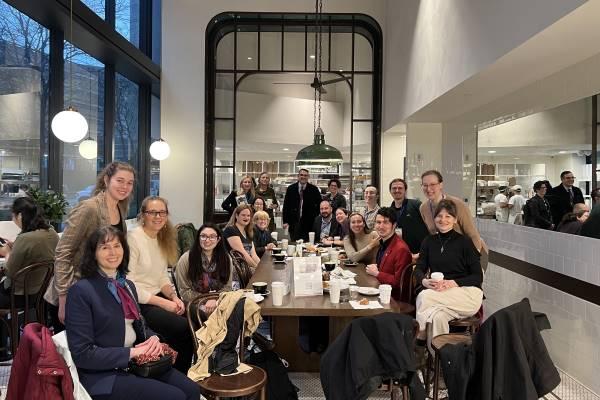Notes from a First-Time Attendee at the ASEEES Conference

By Devon Rancourt, CSEEES MA Student
In November, I had the wonderful opportunity to attend the Association for Slavic, East European and Eurasian Studies (ASEEES) conference in Boston, Massachusetts, for the first time. It was useful to be at the conference without presenting, since I was able to spend my time visiting panels, familiarizing myself with the conference format, and observing how scholars in the field present their work. I was also able to watch fellow Ohio State graduate students Mykyta Tyshchenko and Siobhán Seigne present their papers, which were excellent.
There were numerous panels that sparked my interest, so I prioritized my schedule according to which topics would be relevant to my research and help me narrow down ideas for my upcoming master’s thesis. I am primarily interested in shifting identities in Bulgaria and the Western Balkans, and fortunately there were several panels related to the region to choose from. First, I attended “Close Encounters: Seeing and Believing after Socialism in Bulgaria and Beyond,” which focused on contacts with the strange and supernatural, including topics such as conspiracy theories, extraterrestrial power, bio-healers, energy therapists, and seers in postsocialist Bulgaria. Several other panels I went to during the conference included papers exploring issues related to identity, a broad theme which connects to my own research. “Critical Approaches to Forgotten, Overlooked, and Ignored Histories,” chaired by CSEEES alumna and Ohio State professor Sunnie Rucker-Chang, was particularly impactful and involved my region of research, the Balkans. The featured papers discussed communities who are marginalized in European societies, including Afro-Turks, Roma, Balkan Egyptians, and African women who studied in the Soviet Union and the German Democratic Republic. Rucker-Chang presented about the images of Black womanhood represented in different forms of media in the Yugoslav region. The scholars on this panel focus on the histories that are left out of archives and dominant narratives of the past, specifically, the histories and contributions of formerly colonized and enslaved peoples and individuals who belong to those communities.
Experiencing ASEEES in person was also an excellent opportunity for networking and gathering potential sources to use for my own academic projects. It was enjoyable and informative to have coffee with Ohio State alumni and meet scholars whose work I have read in my fall semester courses. I was fortunate to meet anthropologist Elana Resnick and discuss her research, as well as her experience carrying out fieldwork in Bulgaria. Additionally, I was able to reconnect with faculty from my undergraduate institution, Connecticut College, during the conference. Finally, I was able to meet with alumni of the Fulbright program in Bulgaria, including former English Teaching Assistants and researchers who were part of my 2023-2024 cohort and previous years. My ASEEES experience has motivated me to apply for future conferences and hopefully contribute my own research to the field.
Devon Rancourt is a first-year MA student in Slavic, East European and Eurasian Studies and a Foreign Language and Area Studies Fellow for Bosnian-Croatian-Serbian. She received a professionalization grant from the Slavic Center Development Fund in order to attend this conference.
